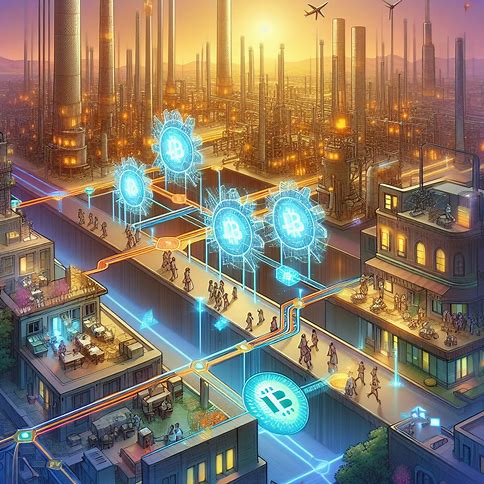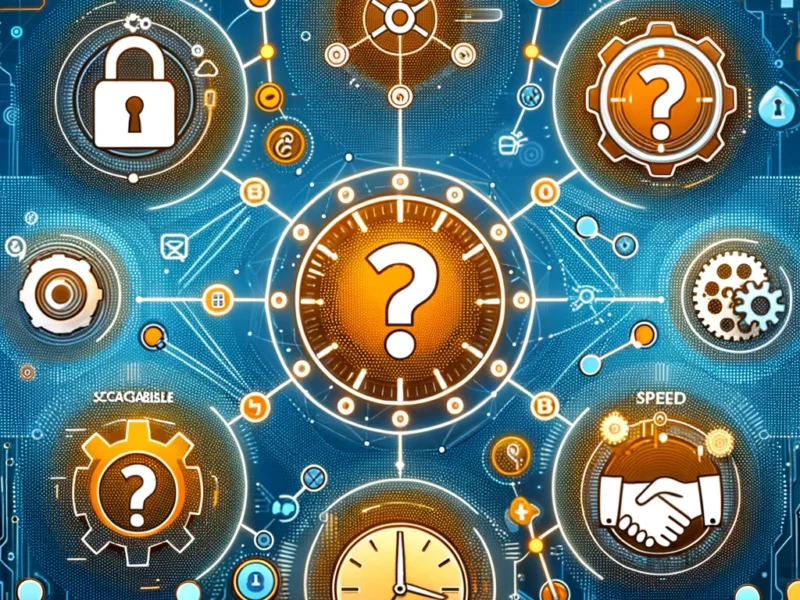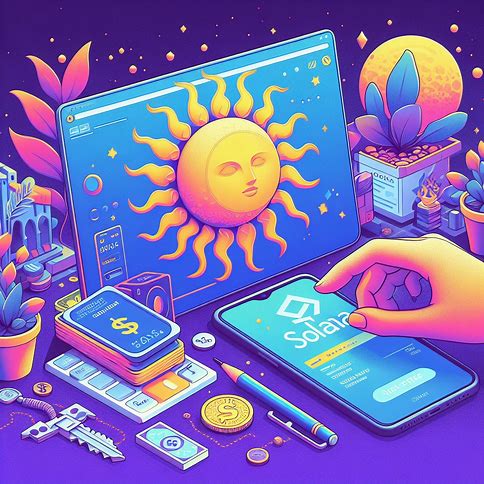Are you curious about the report surrounding blockchain technology but don’t know where to start? In this beginner’s guide, we’ll break down the basics of blockchain, look into its potential and how it’s transforming various industries.
Get ready to learn the fundamentals and gain a solid understanding of what blockchain is all about!
A Beginner’s Guide to Blockchain Technology

What Is A Blockchain?
The digital ledger that’s shared across a network of computers. Each block in the chain contains a batch of transactions, and once a block is added, it’s permanently recorded and cannot be altered.
This immutability is one of the key features that makes blockchain so secure and trustworthy.
Imagine you’re sending money to a friend.
In a traditional system, you’d rely on a bank to carry out the transaction and update their records accordingly. With blockchain, the transaction is recorded directly on the ledger, verified by the network, and added to the chain.
This prevent the need for intermediaries and ensures that the transaction is transparent and tamper-proof.
But blockchain isn’t just about financial transactions.
Its potential applications span across various industries, from supply chain management to healthcare and beyond.
By using the power of blockchain, businesses can ease the processes, reduce costs, and boost security.
One of the most exciting aspects of blockchain is its decentralized nature.
Unlike traditional systems where a central authority controls the flow of information, blockchain operates on a peer-to-peer network.
This means that no single entity has control over the ledger, making it resistant to tampering and corruption.
Another key feature of blockchain is its consensus mechanism.
Before a block can be added to the chain, it must be validated by the network participants. This ensures that everyone agrees on the state of the ledger and prevents fraudulent activities.
The most common consensus mechanisms are Proof of Work (PoW) and Proof of Stake (PoS), each with its own unique characteristics.
Why is blockchain technology so revolutionary?
For starters, it offers unparalleled security. Since each block is cryptographically linked to the previous one, it’s virtually impossible to alter the ledger without detection.
This makes blockchain an ideal solution for storing sensitive data, such as medical records or financial information.
Moreover, blockchain’s transparency and immutability enable trust among participants.
Since everyone has access to the same ledger, there’s no room for discrepancies or disputes.
This transparency can help combat fraud, reduce errors, and increase accountability across various industries.
Blockchain also has the potential to transform the way we conduct business.
By preventing intermediaries and automating processes through smart contracts, blockchain can streamline operations and reduce costs.
Imagine a case where you can instantly and securely transfer ownership of assets, such as real estate or intellectual property, without the need for paperwork or intermediaries. That’s the power of blockchain.
Of course, like any new technology, blockchain isn’t without its challenges. Scalability has been a major hurdle, as the current infrastructure struggles to handle a high volume of transactions.
However, researchers and developers are actively working on solutions, such as off-chain transactions and sharing, to address these limitations.
Another concern surrounding blockchain is its energy consumption.
The Proof of Work consensus mechanism, used by Bitcoin and other cryptocurrencies requires significant computational power, which translates to high energy usage.
However, alternative consensus mechanisms, such as Proof of Stake, are being developed to mitigate this issue and make blockchain more environmentally friendly.
Despite these challenges, the potential of blockchain technology is undeniable. Its applications extend far beyond cryptocurrencies and we’re only scratching the surface of what’s possible. From supply chain management to voting systems, blockchain has the potential to change the way we interact and transact.
When supplying chain management, blockchain can bring unprecedented transparency and traceability. By recording each step of a product’s journey on the blockchain, businesses can easily track its origin, ensure quality control, and prevent counterfeiting.
Related: 10 Tools You Must have as a Crypto Trader
This is particularly valuable in industries such as food and pharmaceuticals, where safety and authenticity are paramount.
Blockchain is also poised to disrupt the world of finance.
Decentralized finance (DeFi) platforms, built on blockchain technology, are enabling peer-to-peer lending, borrowing, and trading without the need for traditional financial institutions.
This opens up new opportunities for financial inclusion and empowers individuals to take control of their financial lives.
Moreover, blockchain’s potential extends to the public sector. Governments around the world are exploring the use of blockchain for secure record-keeping, identity management, and even voting systems. By using blockchain’s immutability and transparency, we can create more efficient and trustworthy public services.
As a beginner, going into blockchain can be overwhelming.
But don’t let that deter you at all!
There are plenty of resources available to help you get started.
From online courses and tutorials to community forums and meetups, you can find support and guidance as you embark on your blockchain journey.
One of the best ways to learn about blockchain is by getting hands-on experience.
You can start by setting up a digital wallet and experimenting with small transactions. Many blockchain platforms, such as Ethereum, offer test networks where you can explore and build applications without risking real funds.
It’s also essential to stay informed about the latest developments in the blockchain space.
Follow industry blogs, attend conferences, and engage with the community to stay up-to-date on emerging trends and innovations.
As blockchain technology continues to grow, there will be endless opportunities for learning and growth.
Key Takeaways:
1. Blockchain is a decentralized, distributed ledger technology that enables secure and transparent record-keeping without intermediaries.
2. Blockchain’s potential applications extend beyond cryptocurrencies including supply chain management, healthcare, finance, and more.
3. The technology offers unparalleled security, transparency, and immutability, fostering trust among participants and reducing the risk of fraud and tampering.
4. Blockchain’s decentralized nature and consensus mechanisms ensure that no single entity controls the ledger, making it resistant to corruption.
5. Challenges such as scalability and energy consumption need to be addressed for blockchain to reach its full potential.
6. The blockchain ecosystem consists of various stakeholders, including developers, miners, investors, and regulators, each playing a crucial role in shaping the technology’s future.
7. Investing in blockchain and cryptocurrencies comes with risks, and it’s essential to approach the technology with a critical eye and stay informed about the latest developments.
8. As blockchain continues to mature and gain mainstream adoption, we can expect to see a wave of innovation and disruption across various industries.
9. Staying curious, continuously learning, and engaging with the community are key to navigating the blockchain landscape and seizing the opportunities it presents.
10. The future of blockchain is bright, with endless possibilities for growth, innovation, and transformation across multiple sectors.
Frequently Asked Questions
1. What is blockchain technology?
Blockchain is a decentralized, distributed ledger technology that records transactions across a network of computers, ensuring security, transparency, and immutability without the need for intermediaries.
2. How does blockchain work?
Blockchain works by recording transactions in blocks that are cryptographically linked together, forming a chain. Each block contains a batch of transactions, and once added to the chain, it cannot be altered. The ledger is shared across a peer-to-peer network, and consensus mechanisms ensure that all participants agree on the state of the ledger.
3. Is blockchain only used for cryptocurrencies?
No, while blockchain gained popularity through cryptocurrencies like Bitcoin, its potential applications extend far beyond digital currencies.
Blockchain can be used in various industries, such as supply chain management, healthcare, finance, and more.
4. What are the benefits of blockchain technology?
Blockchain offers several benefits, including increased security, transparency, and immutability.
It prevents the need for intermediaries, reduces the risk of fraud and tampering, enable trust among participants. Blockchain also has the potential to streamline processes, reduce costs, and enable new business models.
5. What are smart contracts?
Smart contracts are self-executing contracts with the terms of the agreement directly written into code.
They automatically execute when predetermined conditions are met, eliminating the need for intermediaries and ensuring that all parties adhere to the agreed-upon terms.
6. What is a consensus mechanism?
A consensus mechanism is a protocol that ensures all participants in a blockchain network agree on the state of the ledger.
The two most common consensus mechanisms are Proof of Work (PoW) and Proof of Stake (PoS).
These mechanisms prevent fraudulent activities and ensure the integrity of the blockchain.
7. What are the challenges faced by blockchain technology?
Blockchain faces challenges such as scalability, as the current infrastructure struggles to handle high transaction volumes.
Energy consumption is another concern, particularly with Proof of Work consensus mechanisms.
Regulatory uncertainty and public perception are also hurdles that need to be overcome.
8. How can I get involved in the blockchain space?
There are numerous ways to get involved in the blockchain space, depending on your interests and skills. You can learn about the technology through online courses, tutorials, and community forums.
You can also participate in hackathons, contribute to open-source projects, or join blockchain-focused organizations and meetups.
9. Is investing in blockchain and cryptocurrencies safe?
Investing in blockchain and cryptocurrencies comes with risks, such as market volatility, regulatory uncertainty, and the potential for scams and hacks.
It’s necessary for you to make sure that you understand the risks involved, and only invest what you can afford to lose. Always stay informed about the latest developments and best practices in the space.
10. What is the future of blockchain technology?
The future of blockchain is promising, with endless possibilities for innovation and disruption across various industries.










